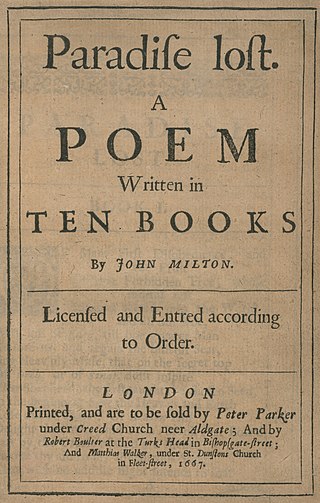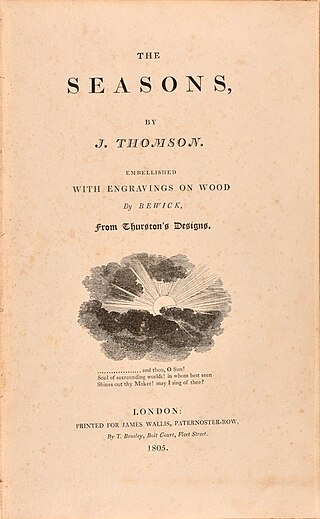Related Research Articles

John Milton was an English poet, polemicist, and civil servant. His 1667 epic poem Paradise Lost, written in blank verse and including twelve books, was written in a time of immense religious flux and political upheaval. It addressed the fall of man, including the temptation of Adam and Eve by the fallen angel Satan and God's expulsion of them from the Garden of Eden. Paradise Lost elevated Milton's reputation as one of history's greatest poets. He also served as a civil servant for the Commonwealth of England under its Council of State and later under Oliver Cromwell.

Paradise Lost is an epic poem in blank verse by the English poet John Milton (1608–1674). The first version, published in 1667, consists of ten books with over ten thousand lines of verse. A second edition followed in 1674, arranged into twelve books with minor revisions throughout. It is considered to be Milton's masterpiece, and it helped solidify his reputation as one of the greatest English poets of all time. The poem concerns the biblical story of the fall of man: the temptation of Adam and Eve by the fallen angel Satan and their expulsion from the Garden of Eden.

Andrew Marvell was an English metaphysical poet, satirist and politician who sat in the House of Commons at various times between 1659 and 1678. During the Commonwealth period he was a colleague and friend of John Milton. His poems range from the love-song "To His Coy Mistress", to evocations of an aristocratic country house and garden in "Upon Appleton House" and "The Garden", the political address "An Horatian Ode upon Cromwell's Return from Ireland", and the later personal and political satires "Flecknoe" and "The Character of Holland".

The term Metaphysical poets was coined by the critic Samuel Johnson to describe a loose group of 17th-century English poets whose work was characterised by the inventive use of conceits, and by a greater emphasis on the spoken rather than lyrical quality of their verse. These poets were not formally affiliated and few were highly regarded until 20th century attention established their importance.
"To His Coy Mistress" is a metaphysical poem written by the English author and politician Andrew Marvell (1621–1678) either during or just before the English Interregnum (1649–60). It was published posthumously in 1681.

Paradise Regained is a poem by English poet John Milton, first published in 1671. The volume in which it appeared also contained the poet's closet drama Samson Agonistes. Paradise Regained is connected by name to his earlier and more famous epic poem Paradise Lost, with which it shares similar theological themes; indeed, its title, its use of blank verse, and its progression through Christian history recall the earlier work. However, this effort deals primarily with the temptation of Christ as recounted in the Gospel of Luke.

The State of Innocence is a dramatic work by John Dryden, originally intended as the libretto to an opera. It was written around 1673–4, and first published in 1677. The work is a rhymed adaption of John Milton's epic poem Paradise Lost, and retells the Biblical story of the fall of man.

John Carey is a British literary critic, and post-retirement (2002) emeritus Merton Professor of English Literature at the University of Oxford. He is known for his anti-elitist views on high culture, as expounded in several books. He has twice chaired the Booker Prize committee, in 1982 and 2003, and chaired the judging panel for the first Man Booker International Prize in 2005.
"Upon Appleton House" is a poem written by Andrew Marvell for Thomas Fairfax, 3rd Lord Fairfax of Cameron. It was written in 1651, when Marvell was working as a tutor for Fairfax's daughter, Mary. An example of a country house poem, "Upon Appleton House" describes Fairfax's Nunappleton estate while also reflecting upon the political and religious concerns of the time.

A Preface to Paradise Lost is one of C. S. Lewis's most famous scholarly works. The book had its genesis in Lewis's Ballard Matthews Lectures, which he delivered at the University College of North Wales in 1941. It discusses the epic poem Paradise Lost, by John Milton.
"The Garden" is a widely anthologized poem by the seventeenth-century English poet, Andrew Marvell. The poem was first published posthumously in Miscellaneous Poems (1681). “The Garden” is one of several poems by Marvell to feature gardens, including his “Nymph Complaining for the Death her Fawn,” “The Mower Against Gardens,” and “Upon Appleton House.”

Milton's 1645 Poems is a collection, divided into separate English and Latin sections, of John Milton's youthful poetry in a variety of genres, including such notable works as An Ode on the Morning of Christ's Nativity, Comus and Lycidas. Appearing in late 1645 or 1646, the octavo volume, whose full title is Poems of Mr. John Milton both English and Latin, compos'd at several times, was issued by the Royalist publisher Humphrey Moseley. In 1673, a year before his death, Milton issued a revised and expanded edition of the Poems.
Paradise Lost has had a profound impact on writers, artists and illustrators, and, in the twentieth century, filmmakers.
Nationality words link to articles with information on the nation's poetry or literature.
The reception history of John Milton and his works has been a mixture of positive and negative responses, with his greatest influence being found within his poetry.

The Seasons is a series of four poems written by the Scottish author James Thomson. The first part, Winter, was published in 1726, and the completed poem cycle appeared in 1730.
Nathaniel Ingelo was an English clergyman, writer and musician, best known for the allegorical romance Bentivolio and Urania.
Nationality words link to articles with information on the nation's poetry or literature.
Annabel M. Patterson is the Sterling Professor Emeritus of English at Yale University.
References
- ↑ The Poems Of Andrew Marvell (Revised Edition) - Edited By Nigel Smith (Pearson Longman 2006)